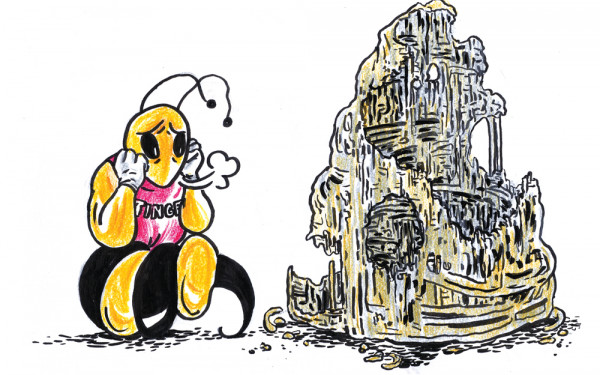The Hive Is Finally Buzzing at Loyola
Café Co-op Opens Later Than Projected
After a long and difficult planning process, the Concordia Student Union has officially launched the Loyola Hive Café and its attached student space two weeks after the planned opening date.
The space was set to open the second Wednesday of the month, but was delayed by a plethora of factors.
“[It was] mostly equipment installation, the espresso machine’s installation was trickier than they thought,” CSU VP Loyola Gabriel Velasco said of the delay.
He added that getting the Loyola Luncheon—a CSU-funded meal program offering students a free vegetarian lunch five days a week—and the downtown Hive Café up and running had taken priority.
The CSU came close to opening the café in 2010, but its electrical consumption would have exceeded the building’s capacity, and funds for the project were lacking. The project has been steadily moving forward since last year’s VP Loyola, Crystal Harrison, finalized plans for electrical upgrades and construction.
Velasco has since overseen construction and ironed out the kinks.
“What helped this time was [last year’s] referendum passed, [which allowed us] to use the student space fund instead of continuously saving up this money,” Velasco said.
The cost for the renovations are estimated at $100,540, which includes construction and maintenance. Half the sum was provided by the university. The rest was taken on by the CSU, although the CSU didn’t do it alone.
$30,000 was raised with the help of the Corporation de développement économique communautaire Côte-des-Neiges/Notre-Dame-de-Grâce, an organization “that funds small social economy enterprises,” and the Sustainability Action Fund, a fee-levy group at Concordia geared towards sustainable projects on campus, who raised $14,000.
“With Chartwells, there is zero accountability; they do as they please for 10 years and students are very much disenfranchised.”
—Gabriel Velasco, CSU VP Loyola
Velasco has high hopes for the project. “It’s a work in progress based on models of co-ops, […] the idea we have now is getting members involved in developing it into what they want to see,” he said.
The co-op is currently operating with a catering model, but aims to “produce everything from scratch” in the future. “We try as much as we can to get suppliers that are local, organic, small business and family-owned,” Velasco noted.
The teas and vegetables used in the café and Loyola Luncheon are provided by the Concordia Greenhouse City Farm School. By keeping suppliers local, the student union hopes to keep the café financially stable while remaining affordable.
This year, cafeteria operator Chartwells lowered its prices, a move coinciding with its approaching expiration of its current food-services contract with the university.
“With Chartwells, there is zero accountability; they do as they please for 10 years and students are very much disenfranchised,” Velasco said.“Nothing is [decided by] collective decisions, [you have to] accept and buy their things or not.”
The co-operative governance model is intended to be open, and student participation is encouraged.
“We want to involve students as much as possible,” said Velasco, adding “the lifeblood is volunteers,” which is especially true for the Loyola Luncheon, which has only one paid staff member.
The final touch on the space will be the murals covering the large grey walls of the student space. The selected person or team will work with members of the CSU to develop mural concepts.
Velasco anticipates a mural that “showcases the creative capacity of Concordia students.” He estimates the project will be completed before the end of the fall semester.
“It’s a beautiful space where students should be hanging out and studying,” he added.

_900_600_90.jpg)


1_600_375_90_s_c1.jpg)

_600_375_90_s_c1.jpg)
_600_375_90_s_c1.jpg)